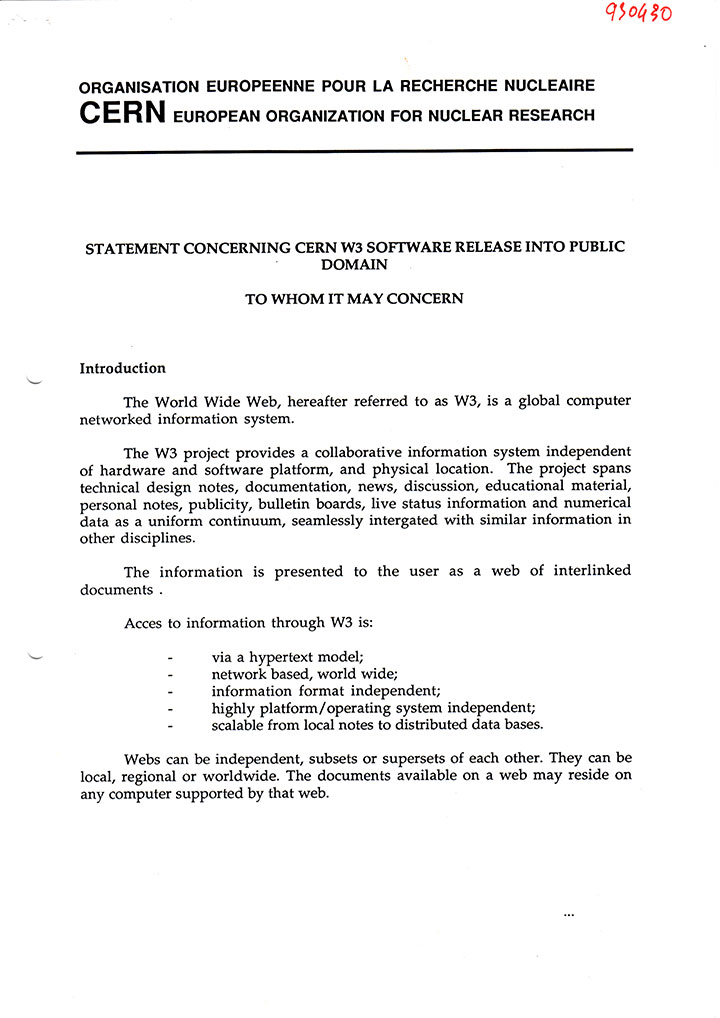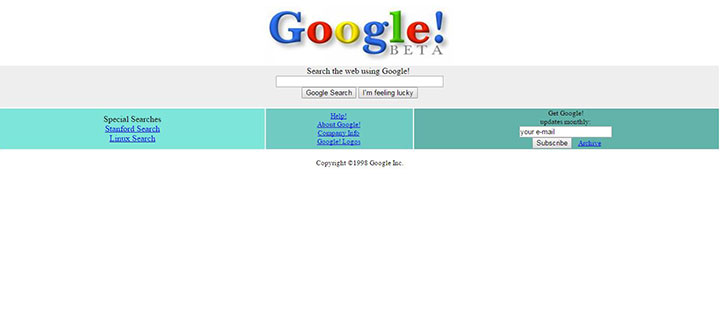On Aug. 23, 1991, the way humanity communicated with one another was forever changed with the creation of the World Wide Web.

The man responsible was Tim Berners-Lee, a British computer scientist who was working in Switzerland’s CERN (there was no particle accelerator then).
READ MORE: Facebook rolls out suicide prevention tools to Canadians
In order for scientists to access information at CERN, they had to physically go to different computers. Berners-Lee thought this was inefficient. At that time, the Internet was already connecting millions of computers. He realized that, using this emerging technology, information could be shared using hypertext, which was created in 1965 by Ted Nelson.
In March 1989, Berners-Lee proposed this to his boss who, believe it or not, wasn’t all that impressed. Instead, he wrote “vague but exciting” on the proposal. Still, Berners-Lee managed to get time to further develop his idea. By 1990, he had created three vital technologies that we’re quite familiar with today: HTML (Hypertext Markup Language), URI (uniform resource identifier, which we now call URL) and HTTP (hypertext transfer protocol).
By the end of the year, the first web page was up on the Internet, and by 1991, the public was invited to use it.
Berners-Lee knew that, in order for the web to grow, it had to be readily and freely available to the public. So, in 1993, the code was made available to anyone around the world. Thus, the World Wide Web was born.
A look back
According to the Massachusetts Institute of Technology (MIT), in June 1993, there were 130 websites. By December 1993 that number had almost doubled to 623. Between 1993 and 1994, there was a growth of 2,006 per cent as the number rose to more than 2,700 sites. And just four years later it had grown to roughly 650,000. Today, there are more than one billion. You can even see the live stats on Internet Live Stats.
Here is a look back at the birth of some of the most popular websites over the years (click on the link to see what it looked like at the time).
1991: World Wide Web Project
It was what started it all. Thank you, CERN and Tim Berners-Lee.
1994: Yahoo!
- Ontario First Nation declares state of emergency amid skyrocketing benzene levels
- ‘Sciatica was gone’: hospital performs robot-assisted spinal surgery in Canadian first
- Do Canadians have an appetite for electric vehicles? Experts are divided
- More financial institutes are offering crypto-services, survey shows
Yahoo! ruled the early days of the Internet. By 1998, it was the most popular web portal for Internet users. However, since 2000, its popularity has declined, though it remains one of the most-read news and media websites.
1994: Amazon
The way people shopped was forever changed with Amazon. The online shopping site — originally called Cadabra — was founded in 1994 by Jeff Bezos. He changed the name to Amazon and the site first went online in 1995. Originally beginning as an online bookstore, today it sells everything from DVDs to electronics to bedding to clothing. It is worth an estimated US$250 billion.
1996: AOL
Though America Online (AOL) was founded in 1983 as Control Video Corporation, it eventually outgrew its video gaming foundation turning to the Internet. It gets its own website address and drops its monthly fee of $19.95, providing Internet users with access to mail, news and more.
1998: Google
Today, Google is a worldwide presence. “Googling” was even added to the Oxford Dictionary in 2006. The name is a play on the very large mathematical number of a googol, which is a 1 followed by 100 zeros. The search engine is quickly praised for its ability to source information on the Internet.
1999: PayPal
Today, PayPal is the world’s largest payment system, allowing people to transfer money easily. The company was founded in 1998 as Confinity, which developed security software for phones and other hand-held devices. It became what it is today in 1999, founded by John Malloy. In 2000, the company merged with X.com, an online banking company founded by tech guru Elon Musk, today best known for SpaceX and Tesla.
2001: Wikipedia
According to Wikipedia, the online encyclopedia launched on Jan. 15, 2001. It initially began as Nupedia, in 2000, which would hold peer-edited, expert written content. However, it never got off the ground. Instead, the creators decided to create a new website where anyone could contribute and edit. Of course, that caused some headaches as the site was criticized for its inaccuracies. However, since then, efforts have been made to better edit its content. Today, it is available in 271 different languages.
2004: Thefacebook
There is no doubt that Facebook made an enormous impact on society and the way we communicate, whether one believes it to be positive or negative. Initially created by 23-year-old Mark Zuckerberg as a Harvard University social network, today the site boasts more than one billion daily active users around the world. Thanks to Facebook, we now know what people eat, where they go, what they think about your political views and how cute their cat is.
2005: YouTube
YouTube was born out of PayPal when the company’s employees created a video-sharing website. The first video uploaded was titled, “Me at the Zoo.” By 2006, it was one of the fastest-growing sites on the web and in 2006 was bought by Google. In fact, due to the increasing popularity of YouTube, and then other sites that followed, in 2008, an article in the Telegraph claimed that experts were warning that the entire Internet could collapse entirely.
2006: Twttr
Adopting the saying, “Brevity is the soul of wit” from Shakespeare’s Hamlet, Twitter taught us to keep our thoughts short and simple. The website and application was founded by Jack Dorsey and Evan Williams as a way to text on their cellphones. The first tweet was sent by Dorsey on March 21 that year. Now you know who to blame for the rise of bad spelling and grammar.
Since the advent of the World Wide Web, the way we see the world has changed dramatically. Facebook reunited us with those we thought would remain part of our past, left only to fading memories. We only need to check our phones to see events unfolding around the world in short tweets. If we’re unfamiliar with a topic, we simply need to type the words into Google which in turn turns up a multitude of entries, usually the first of which is Wikipedia.
It’s unlikely Berners-Lee thought his invention would impact the world in such dramatic fashion.
WATCH BELOW: Internet Anniversary








Comments